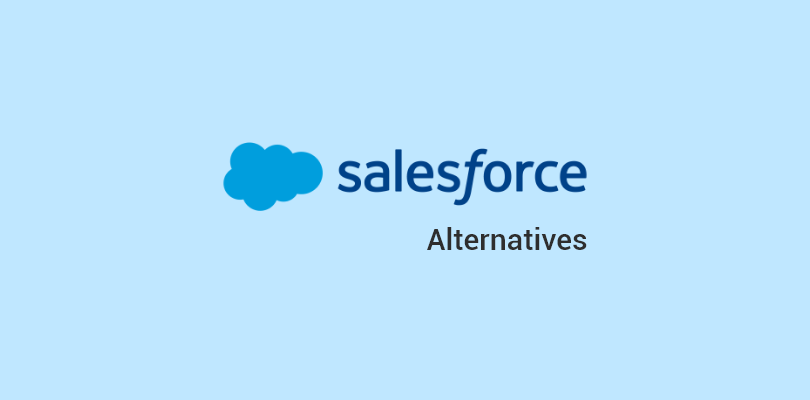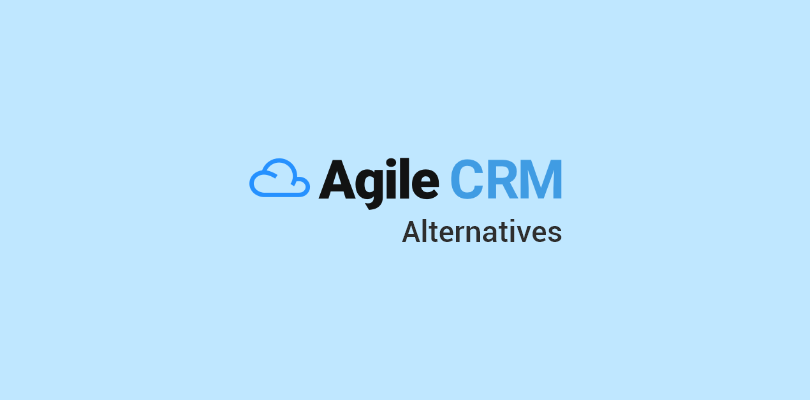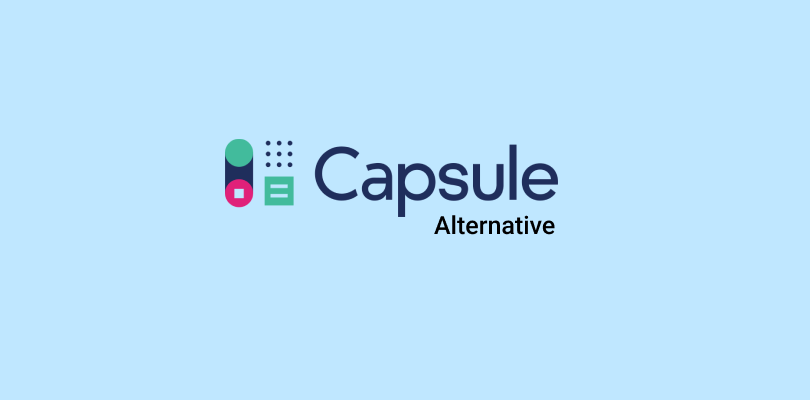I’ve spent years helping businesses fine-tune their sales systems, and one thing I’ve learned is this — a CRM can make or break your sales momentum. Many teams start with Pipedrive because it’s clean, simple, and great at visualizing pipelines. But as your business grows, cracks start to show. Automation feels limited. Integrations get messy. And suddenly, the tool that once fueled your sales feels like it’s holding you back.
If this sounds familiar, you’re not alone. I’ve worked with countless sales teams who hit that same wall — struggling to manage growing data, automate follow-ups, and connect their CRM with marketing or support systems. That’s when exploring Pipedrive alternatives becomes not just an option but a necessity.
In this blog, I’ll share the most reliable, high-performing CRMs I’ve personally tested that can take you beyond what Pipedrive offers — tools that not only streamline your pipeline but also help you sell smarter, faster, and more efficiently.
Why Consider a Pipedrive Alternative?
Pipedrive is a strong CRM, but some teams explore other options when they need:
- Lack of core features in lower-tier plans: Essential capabilities like advanced automation, detailed forecasting, and deeper reporting sit behind higher-priced plans. This can feel restrictive for small teams that need more power without jumping tiers.
- No free plan: Since Pipedrive doesn’t offer a free version, budget-conscious businesses or early-stage teams often compare it with CRMs that provide a no-cost starting point.
- Limited integrations on basic plans: While Pipedrive connects with popular tools, some integrations require add-ons or extra configuration. Teams relying heavily on marketing or support platforms sometimes find this limiting.
- Customization can feel restricted: Users who want more flexible workflow tailoring, custom fields, or unique pipeline setups may find Pipedrive’s structure a bit rigid compared to more expansive CRMs.
- Scaling comes with plan-based limits: Caps on open deals and certain feature restrictions can slow down fast-growing teams unless they upgrade.
- Reporting depth isn’t always enough: Analytics are clean and usable, but businesses that depend heavily on detailed performance reporting often look for platforms with richer dashboards and advanced data visualization.
- Migration isn’t as seamless as expected: Importing and exporting data is possible, but teams often want more guided assistance and clearer workflows during migration, especially when switching from or to more complex systems.
If you’re hitting any of these friction points, exploring a Pipedrive alternative might help you find a CRM that matches your growth, workflow, and long-term strategy more closely.
Top 10 Pipedrive Alternatives
Now, let’s dive into the top 10 CRM alternatives to Pipedrive. Each option is evaluated based on firsthand experience, real user feedback, and key features. I’ll cover pros and cons about each tool, user ratings, and pricing info.
| Tool | Best For | Pricing | User Rating (G2) |
|---|---|---|---|
| BIGContacts | Contact management & email marketing | Free for small teams. Paid plan starts at $9.99/month. | 4.5/5 |
| Zoho CRM | Sales Process Automation | Starts at $14/user/month | 4.1/5 |
| Insightly | CRM + Project Management Scalability | Starts at $29/user/month | 4.2/5 |
| HubSpot CRM | Unified Sales, Marketing & Support | Starts at $20/user/month | 4.4/5 |
| Freshsales | AI-Powered Sales Intelligence | Starts at $15/user/month | 4.5/5 |
| Nutshell | Simple Sales Tracking | Starts at $16/user/month | 4.3/5 |
| ClickUp | Data Visualization & Workflow Management | Starts at $7/user/month | 4.7/5 |
| EngageBay | Collaborative Sales & Marketing | Starts at $12.74/user/month | 4.7/5 |
| Nimble | Automatic Contact Enrichment | Starts at $24.90/user/month | 4.5/5 |
| Zendesk Sell | Pipeline Visibility & Forecasting | Starts at $19/user/month | 4.3/5 |
1. BIGContacts — Best for Contact Management & Email Marketing
I use BIGContacts to manage my customer relationships, and it has quickly become the hub for our sales and marketing work. It combines contact management, pipeline tracking, and email marketing in one simple interface, and I love how easily I can customize deal stages, fields, and dashboards without needing any technical help.
The visual pipeline is one of my favorite features. The drag-and-drop board makes it effortless to move deals along, and I start each day with a clear view of opportunities, priorities, and upcoming tasks. Automated reminders keep me on track, while real-time reports show team activity, performance, and even email campaign results at a glance.
We’ve also connected our website forms to BIGContacts, so new leads flow in automatically. The built-in drip email sequences have made lead nurturing smoother, and the platform scales well as we grow.
Pros:
- The pipeline has a drag-and-drop interface, with customizable stages and user access control
- Seamless webform connections make it easy to collect leads and their details
- Offers pre-built reports as well as the ability to create custom reports from scratch
- Comprehensive calendar views help you schedule appointments, set reminders, and manage your daily activities efficiently
- Automated and personalized drip email campaigns streamline communication and enhance customer engagement
Cons:
- No downloadable or on-premise version
- Dark user interface option not available
How BIGContacts Compares to Pipedrive
While Pipedrive excels at visual pipelines and activity tracking, BIGContacts takes a broader approach by combining CRM, email marketing, and lightweight automation in one place. Its built-in drip sequences, customizable fields, and simpler onboarding give growing teams more flexibility without needing multiple tools. If you want a CRM that manages relationships end-to-end rather than focusing mainly on pipeline visibility, BIGContacts offers more value on lower tiers and scales more smoothly for small teams.
User Rating (G2): 4.5/5
Pricing:
Free for small teams. Paid plan starts at $9.99/month
2. Zoho CRM — Best for Sales Process Automation
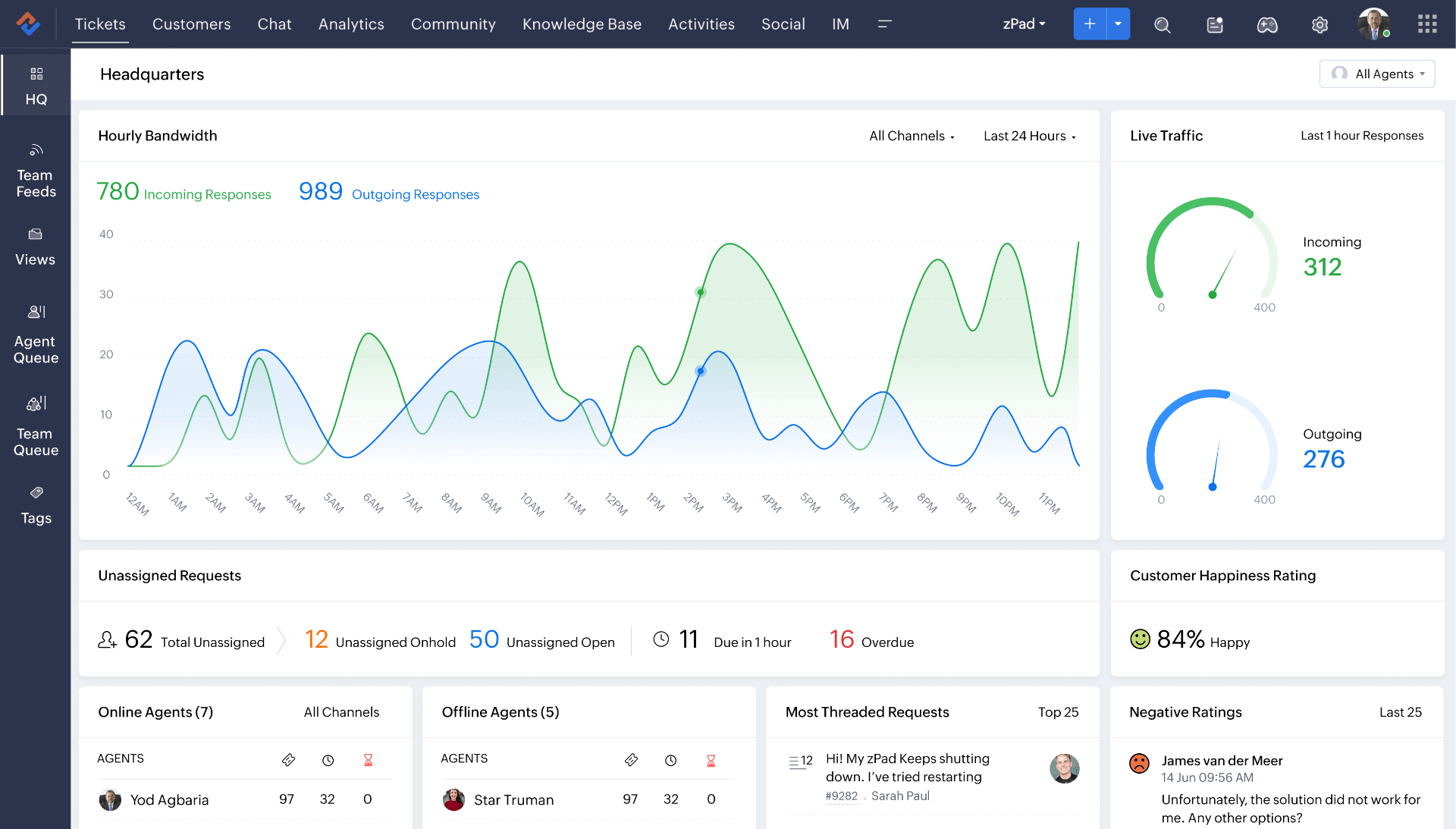
Image Source: Zoho
I’ve used Zoho CRM while helping a client streamline their sales operations, and its automation features stood out right away. We were able to set rules that handled follow-up emails, lead assignment, and other routine tasks automatically, which saved the team a lot of manual work. Customizing modules and fields was also easy with the drag-and-drop editor.
What I found especially helpful was Zoho’s omnichannel communication. Email, calls, chat, and even social media interactions all landed in one clean timeline for each contact. That unified view made it much easier to track conversations and stay organized. The built-in analytics and Zoho’s AI assistant, Zia, also helped by offering deal predictions and useful insights.
The only challenge I encountered was the learning curve. Zoho has a lot of features, so the initial setup took some time, and a few integrations needed extra configuration. Support on the free plan was limited, too, but once everything was set up, the system worked smoothly.
Pros:
- Blueprints help define the sales process for the entire team to follow
- A simple drag-and-drop editor to customize the CRM system according to your requirements
- Journey orchestration lets you create personalized customer journeys and visualize them in real time with intuitive maps
- iOS and Android mobile apps to access valuable business data remotely
Cons:
- It has limited customer support, especially for the free plan
- It has some gaps in application integration, such as with Gmail, Outlook, and Zapier
How Zoho CRM Compares to Pipedrive
While Pipedrive keeps things simple with deal tracking, Zoho CRM leans heavily into automation, customization, and omnichannel communication. Its workflows, blueprints, and AI insights give teams more control over complex sales cycles. If you need deeper automation and an ecosystem that connects sales, marketing, and support in one place, Zoho offers far more flexibility than Pipedrive’s higher-tier add-ons.
User Rating (G2): 4.1/5
Pricing:
Starts at $14 per user per month.
3. Insightly — Best for Scalability & Project-Based Sales
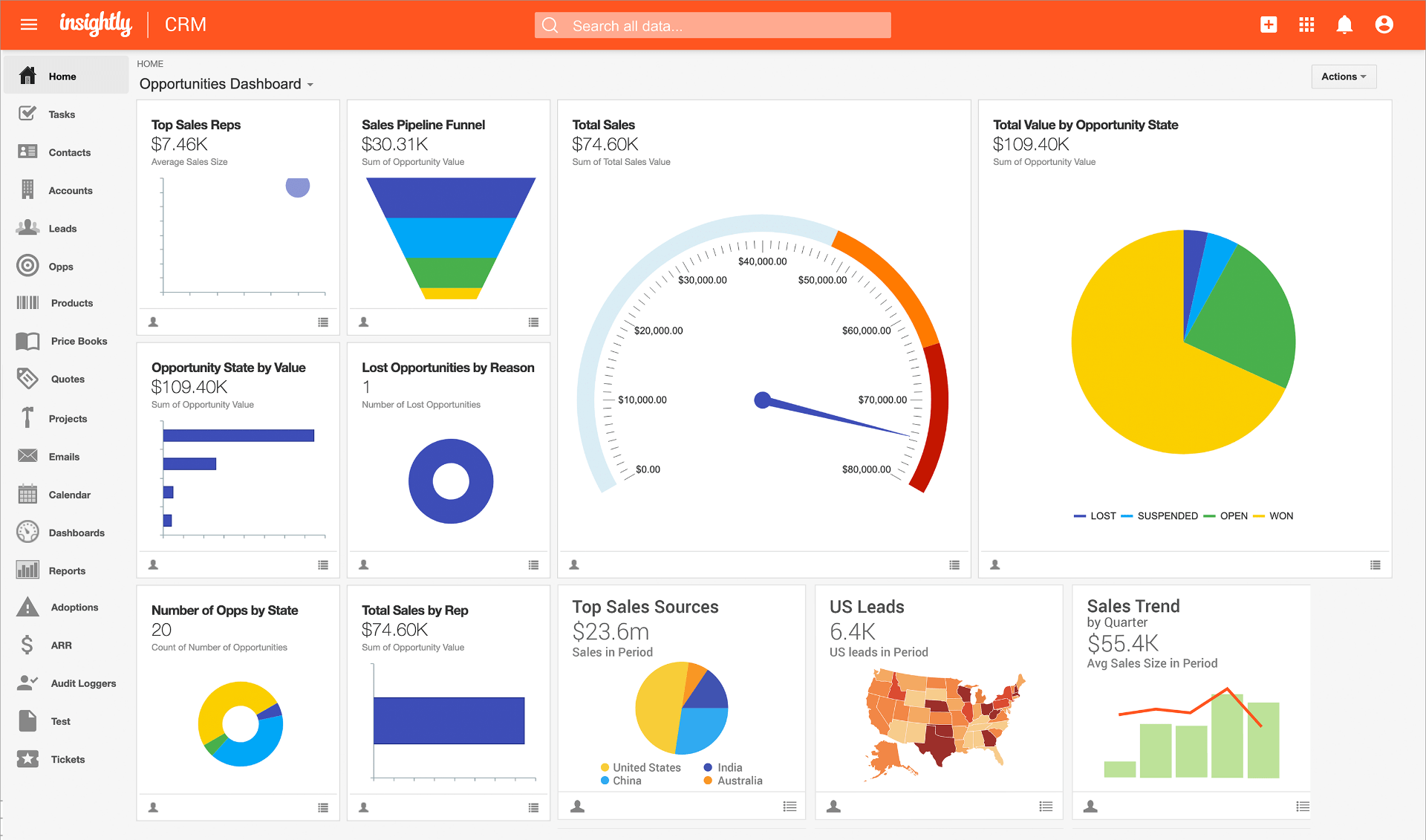
Image Source: Imgix
I tried Insightly with a small team using its free version, and it turned out to be a well-rounded option, especially for businesses that juggle sales and projects. We set up contacts and pipelines quickly, and what really stood out was the way Insightly connects CRM and project management. Converting a won deal into a project and tracking onboarding in the same system kept everyone aligned.
As we grew, the platform scaled well. I liked how customizable Insightly was, from custom fields and layouts to detailed permission controls for different team roles. Its workflow automation also helped us save time. We used it to trigger alerts for high-value leads and automate task reminders based on deal stage changes.
The only drawback we ran into was that some of the more advanced features were locked behind higher-tier plans. And while the pipeline view was smooth, the task management interface felt less intuitive at times. It wasn’t a major issue, but there’s definitely room for a cleaner layout in that area.
Pros:
- Email tracking and synchronization keep your business communication well-organized
- Leads can be prioritized and distributed to sales representatives based on pre-set criteria
- Automation of emails, reminders, etc., contributes to improved efficiency and reduced errors
- Customizable pipelines and milestones aid project management and enhance cross-team collaboration
Cons:
- Features like custom validation rules, field-based permissions, etc., are only available in the highest-priced version of the tool
- Task organization and linking are not highly efficient
How Insightly Compares to Pipedrive
While Pipedrive keeps things simple with deal tracking, Insightly focuses on bringing sales, project management, and relationship building into one connected platform. Its workflow automation, customizable pipelines, and integrated project tracking give teams more control over post-sale execution and long-term customer management. If you need a CRM that not only closes deals but also manages ongoing projects, tasks, and delivery processes, Insightly offers a broader set of capabilities compared to Pipedrive’s more sales-only approach.
User Rating (G2): 4.2/5
Pricing:
Starts at $29/user/month.
4. HubSpot CRM — Best for Unified Sales, Marketing & Support

Image Source: HubSpot
I’ve used HubSpot CRM extensively, and what initially pulled me in was its generous free plan. I could track contacts, manage deals, and even run basic email campaigns without paying anything. As our needs grew, upgrading to its Sales, Marketing, or Service Hubs was simple, and having all teams work from the same customer database made collaboration a lot smoother.
Real-time alerts were one of my favorite features. I’d get notified the moment a prospect opened an email or clicked a link, which helped me follow up at exactly the right time. The customizable dashboards also made a big difference. I built separate dashboards for sales, marketing, and support, and the drag-and-drop reports kept everyone aligned. Email templates and automated sequences saved the team a lot of time and improved our outreach consistency.
The main drawback I experienced is cost. HubSpot starts free, but advanced tools like A/B testing, more powerful automation, or predictive lead scoring require higher-tier plans, which can get expensive.
Pros:
- A visual sales pipeline allows you to view, track, and organize deals with ease
- iOS and Android mobile apps help manage deals while on the move
- Offers detailed reports and dashboards that are highly customizable
- Includes a built-in live chat tool that enables real-time communication with website visitors
Cons:
- The free plan lacks a lot of essential features like A/B testing, collaboration, and deal scoring
- The pricing structure is steep, making the tool more expensive compared to other alternatives
How HubSpot CRM Compares to Pipedrive
Pipedrive shines with a simple pipeline, but HubSpot delivers an all-in-one ecosystem that connects sales, marketing, and support. Its free plan already includes strong automation and reporting that Pipedrive limits to higher tiers. Teams looking for long-term scalability and tighter alignment across departments tend to find HubSpot a more complete option.
User Rating (G2): 4.4/5
Pricing:
Starts at $20/user/month.
5. Freshsales (Freshworks CRM) — Best for Sales Intelligence
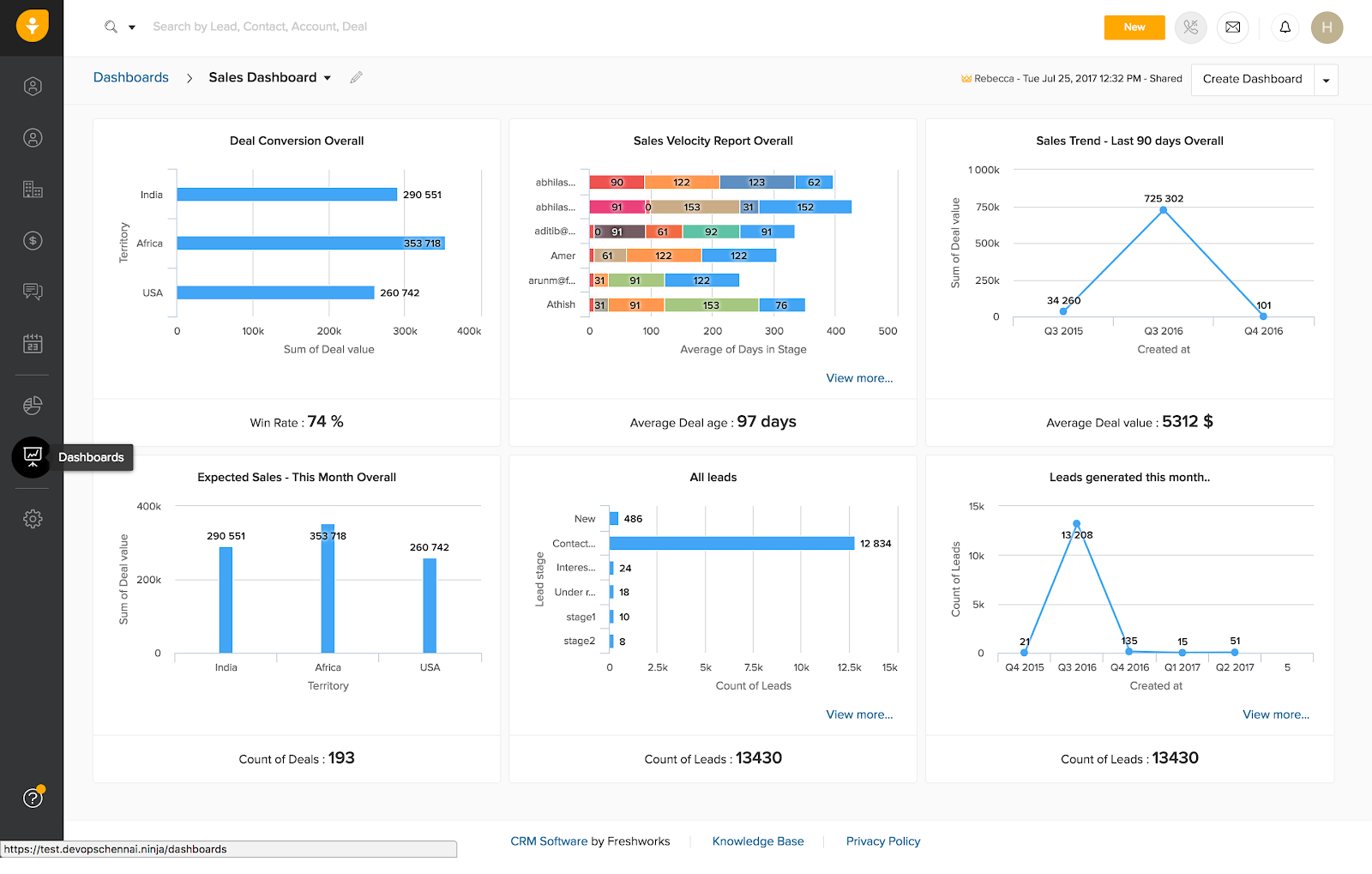
Image Source: Freshsales
I turned to Freshsales when I wanted stronger lead intelligence and AI support, and it immediately felt like a more modern, data-driven CRM. The interface is clean, the deal views are flexible, and its AI engine, Freddy AI, became a real asset. It scored leads automatically based on their behavior, and in my experience, the “hot” leads it highlighted ended up converting far more often.
Freshsales also impressed me with its built-in communication tools. We connected our phone system, logged calls inside the CRM, and used email, chat, and SMS from one place. Every interaction showed up on a unified timeline, which made follow-ups feel more personal. Its automations were another highlight. Tasks like lead routing and welcome emails ran on their own once we set them up, saving the team a ton of manual work.
The only challenge I noticed was the learning curve. Freshsales has a lot of features, which can feel overwhelming for new users. And while there is a free plan, many of the standout capabilities like AI scoring and advanced reporting sit behind the higher-tier options.
Pros:
- Kanban boards, highlight cards, and table views for visualizing customer data
- Multi-channel engagement with customers, including email, phone, Zoom, Facebook, WhatsApp, etc.
- Automated workflows and auto-profile enrichment enhance productivity
- Multiple sales pipelines can be set up to keep track of deals
Cons:
- The learning curve makes it complex and intimidating for beginners to grasp
- While it offers a free basic plan, the most useful features come with the premium versions, potentially making it pricey for smaller businesses
How Freshsales Compares to Pipedrive
While Pipedrive keeps things straightforward, Freshsales introduces stronger AI-driven insight through Freddy AI. Lead scoring, auto-profiling, and built-in multichannel communication help teams prioritize better and personalize outreach. For data-driven teams who want richer intelligence without multiple integrations, Freshsales provides an edge over Pipedrive’s lighter automation.
User Rating (G2): 4.5/5
Pricing:
Starts at $15/user/month.
6. Nutshell — Best for Simple Sales Tracking & Team Collaboration
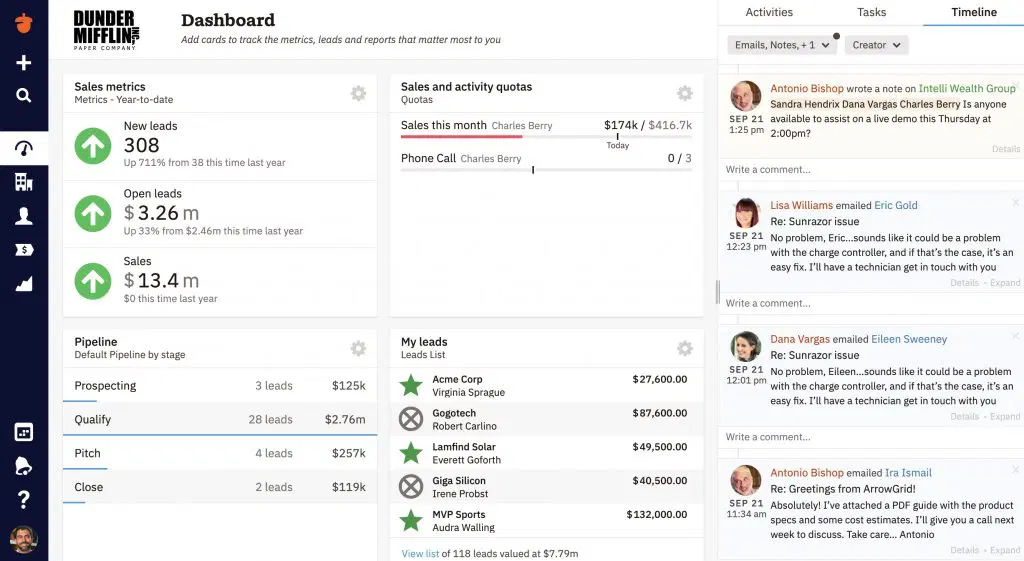
Image Source: Nutshell
I used Nutshell with a non-tech-savvy team, and it was incredibly easy to adopt. The multiple pipeline views stood out — board, list, map, chart, and even a “hot leads” list — so every rep could work in the style they preferred.
Its automation helped us stay consistent. Leads were assigned automatically, follow-up emails triggered on their own, and @mentions kept the whole team aligned. Adding contacts was quick too, with smooth imports, business card scanning, and automatic enrichment that pulled in public details like LinkedIn info.
The only drawbacks I ran into were slower support responses and a few settings hidden deeper in the menus. Still, for simple, flexible, and collaborative sales tracking, Nutshell worked really well for us.
Pros:
- New contact records are automatically enriched with information available on the internet
- The ability to set up automated drip email campaigns to improve your engagement with prospects and customers
- Tags and alerts help keep everyone in the team on the same page
- Customizable and engaging forms help convert website visitors into leads
Cons:
- Customer support is not robust, making it challenging to get assistance when you need it
- Some features are buried under menus, making navigation slightly difficult
How Nutshell Compares to Pipedrive
Pipedrive’s visuals are great, but Nutshell offers more variety with multiple pipeline views, collaborative features, and built-in automation that are easier for non-technical teams to adopt. If you want simplicity without losing flexibility, Nutshell brings a fresher, more team-friendly experience than Pipedrive’s more structured layout.
User Rating (G2): 4.3/5
Pricing:
Starts at $16/user/month.
7. ClickUp — Best for Data Visualization and Workflow Management
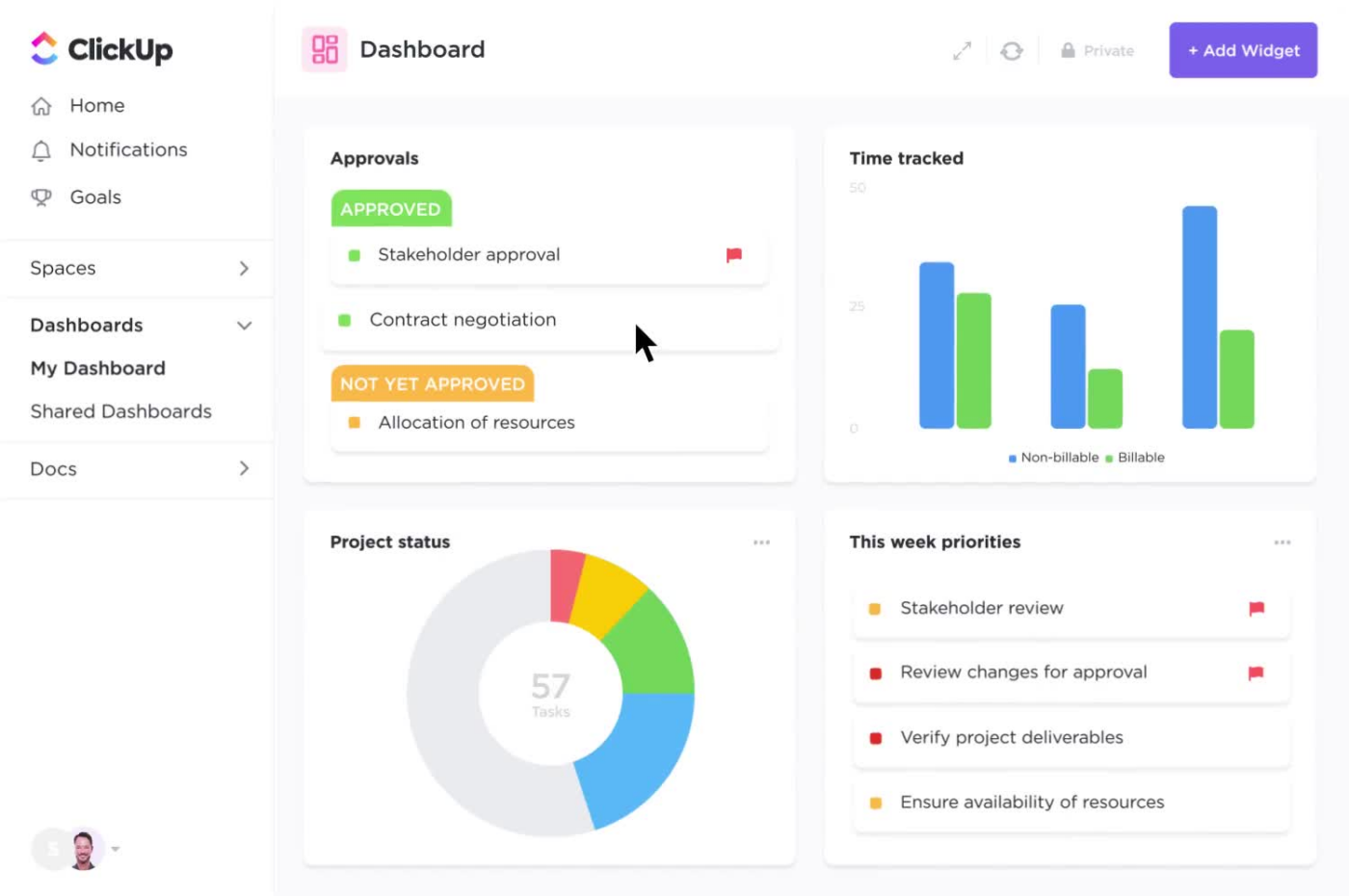
Image Source: Clickup
I tried using ClickUp as a CRM after years of using it for projects, and it worked surprisingly well. We built a custom pipeline with lists and boards, and the live dashboards made it easy to track deal stages, wins, losses, and funnel metrics at a glance.
Each deal sat inside a ClickUp task where we stored notes, files, emails, checklists, and comments. With @mentions, linked Drive documents, and even Docs and Whiteboards, everything related to a deal stayed in one organized place.
The automations helped a lot too, from triggering onboarding tasks to reminding reps about stalled deals. The only drawback was the setup. Since ClickUp isn’t a traditional CRM, customizing fields and views took time. And for team-wide CRM use, the paid plans are usually necessary for dashboards and storage.
Pros:
- Visual sales pipelines offer better clarity on progress and potential bottlenecks
- Offers a range of dashboard widgets to help you get started
- Centralized inbox lets you communicate with customers and collaborate with team members with ease
- You can add links between tasks, documents, and other elements to improve business efficiency
Cons:
- The free version has limited storage, and higher premium tiers can price out small businesses
- It can be overwhelming, especially during the initial setup
How ClickUp Compares to Pipedrive
Pipedrive gives you a sales pipeline. ClickUp gives you a fully customizable workspace. For teams needing CRM plus project management, documentation, and dashboards in one place, ClickUp offers more breadth. It does take more setup, but it becomes a unified system where deals, tasks, and internal collaboration happen together — something Pipedrive isn’t designed for.
User Rating (G2): 4.7/5
Pricing:
Starts at $7/user/month.
8. EngageBay — Best for Collaborative Sales & Marketing on a Budget
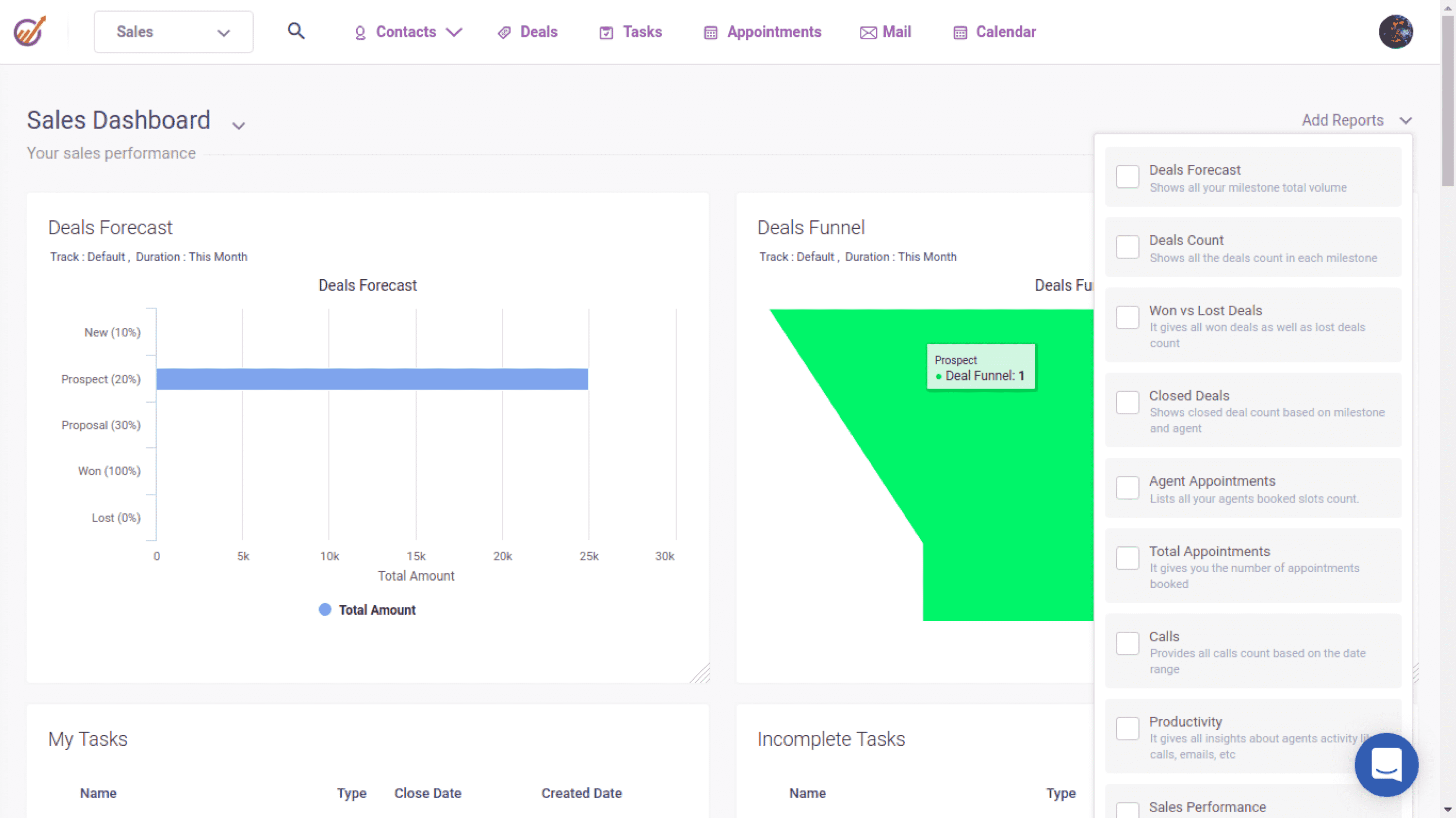
Image Source: EngageBay
I used EngageBay when our sales and marketing teams were small, and it worked well because everything was unified. Leads from forms and campaigns flowed straight into the CRM, so both teams always had the same view of interactions like opens and clicks.
The drag-and-drop pipeline was easy to manage, and the built-in appointment scheduler saved us time. Segmentation was another strong point. We could quickly filter contacts by industry, activity, or behavior and target them with more personalized outreach.
Automation tied everything together. We set workflows that sent welcome emails and created follow-up tasks automatically. The downsides were lighter reporting, a limited mobile app, and the occasional UI quirk, but overall it was a solid all-in-one option for smaller teams.
Pros:
- The intuitive drag-and-drop interface of the sales pipeline simplifies moving deals between stages
- Easy appointment scheduling with automatic calendar syncing and custom time slots
- Contact segmentation based on custom fields, tags, previous interactions, and more
- Automated email sequences and targeted marketing campaigns improve customer engagement
Cons:
- The reporting capabilities of the tool are not very advanced
- The mobile version is not as functional as the desktop version
How EngageBay Compares to Pipedrive
Pipedrive focuses mainly on sales, while EngageBay combines sales, marketing, and basic support tools under one affordable platform. Smaller teams often prefer EngageBay because it unifies campaigns, automations, and pipelines without requiring separate tools. If you’re working with a tight budget and want an all-in-one growth platform, EngageBay stretches further than Pipedrive.
User Rating (G2): 4.7/5
Pricing:
Starts at $12.74/user/month.
9. Nimble — Best for Contact Enrichment and Social CRM
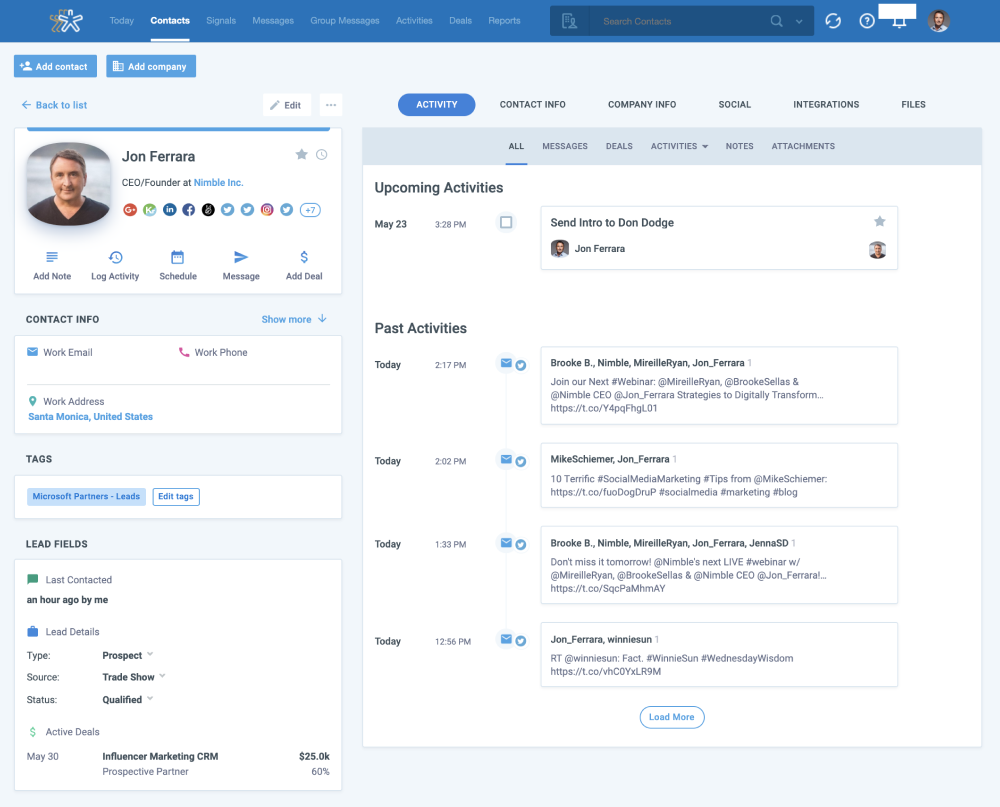
Image Source: Nimble
I used Nimble mainly for relationship-focused sales work, and its automatic contact enrichment was the biggest win. Simply adding a name or email pulled in social profiles, company info, and recent activity, which saved me tons of research time and made outreach feel much more personal.
The “Today Page” became my daily hub. It showed tasks, upcoming meetings, deal updates, and reminders about contacts I hadn’t engaged with recently. I also liked how Nimble brought all communication into one place – emails, Twitter conversations, and LinkedIn messages all appeared on a single timeline, making it easy to stay on top of every interaction.
Nimble’s segmentation and personalized group messaging were great for targeted outreach, but it’s lighter on advanced sales features. Forecasting, deep reporting, and complex automation aren’t its focus. It works best if you want a simple, social-centric CRM rather than a heavy, process-driven system.
Pros:
- Segmentation and targeted emails for improved outreach
- A detailed ‘Today’ page makes it easy to keep track of appointments, pending tasks, pipeline activity, and more
- Nimble automatically matches social and public data for each contact – helping you better understand and connect with customers
- Transforms repetitive administrative tasks into streamlined workflows, creating efficiency between departments
Cons:
- Lacks advanced features like data visualization, A/B testing, and sales forecasting
- The interface can be a little confusing for beginners
How Nimble Compares to Pipedrive
Pipedrive tracks deals well, but Nimble excels at relationship-building. Its contact enrichment, social media integrations, and unified communication timeline create a fuller picture of each prospect. If your sales style is more personal and connection-driven, Nimble offers deeper context than Pipedrive’s more transactional approach.
User Rating (G2): 4.5/5
Pricing:
Starts at $24.90/user/month.
10. Zendesk Sell — Best for Pipeline Visibility & Forecasting
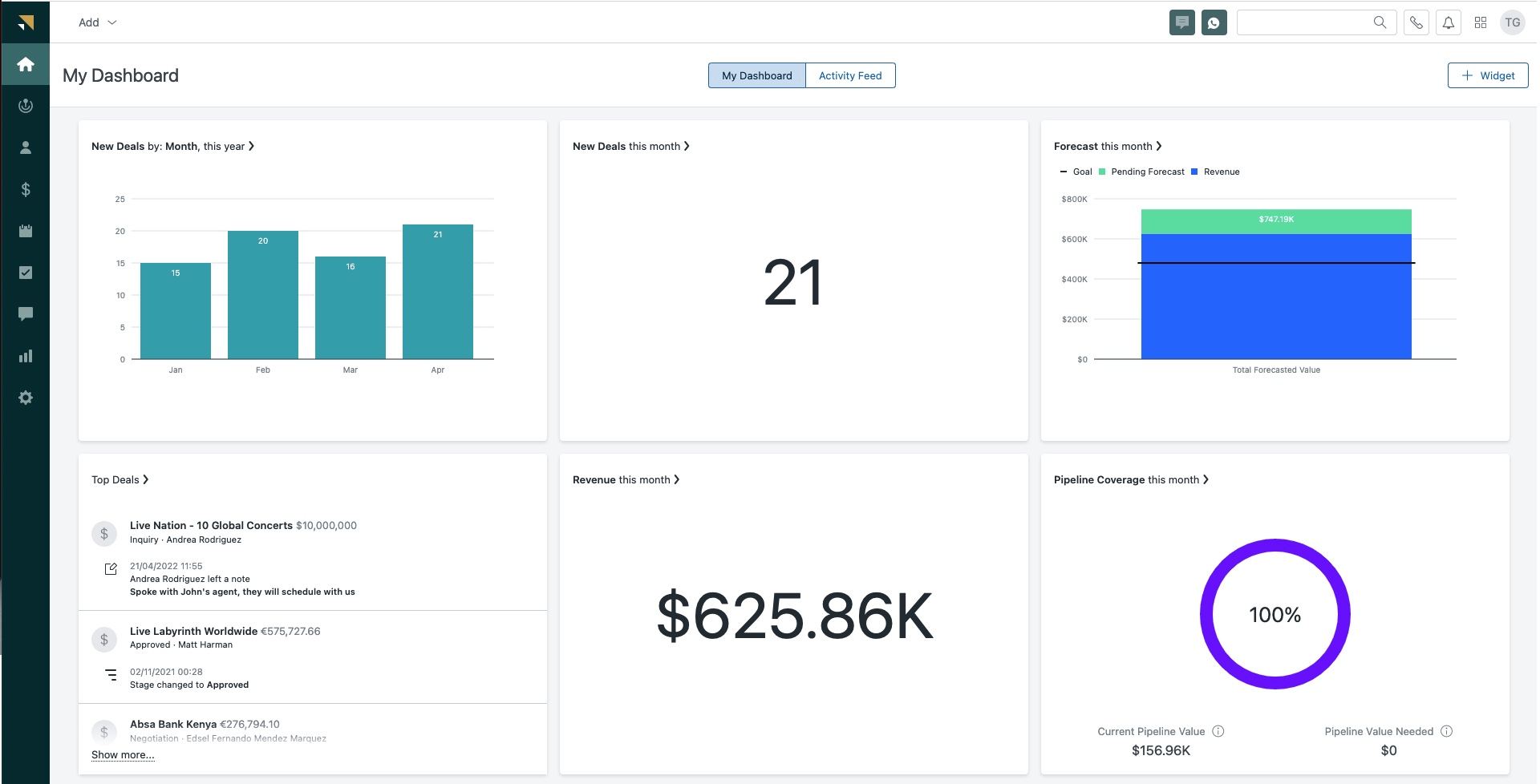
Image Source: Cloudfront
I used Zendesk Sell when our team needed a clean, sales-focused CRM, and its pipeline view was one of the clearest I’ve worked with. Reps could instantly see overdue deals, untouched leads, and progress toward quotas. The forecasting tools were strong too. As a manager, I could quickly check if we were on track for the month and spot bottlenecks in our funnel.
Integrated calling, SMS, and email tracking made Sell a convenient all-in-one workspace. Calls were logged automatically, texts appeared on the contact timeline, and Smart Lists helped us stay organized with dynamic views like “deals closing this month” or “leads not contacted in a week.”
The biggest catch today is that Zendesk Sell is being retired, and new customers can’t sign up. Beyond that, the tool was very sales-centric, with no built-in marketing features, and some integrations required workarounds. As our team grew, costs increased quickly on higher tiers, especially for advanced features.
Pros:
- Custom triggers and automated workflows keep things moving forward effortlessly
- Accurate forecasting and deal prediction empower you to make better decisions
- iOS and Android mobile applications help stay on top of deals from anywhere
- Smart lists facilitate contact segmentation and enhanced targeting
Cons:
- Zendesk Sell may have some integration issues with third-party tools that are not part of the Zendesk ecosystem
- Advanced features like lead scoring and sales forecasting are only available in the higher-priced plans
How Zendesk Sell Compares to Pipedrive
Both tools offer clean pipelines, but Zendesk Sell prioritizes sales visibility and forecasting. Smart Lists, integrated calling, and strong analytics make it easier to track quota progress and follow-ups. However, since Zendesk Sell is being retired, Pipedrive may be the more future-proof option for new teams.
User Rating (G2): 4.3/5
Pricing:
Starts at $19/user/month.
My Top 3 Picks: Which Pipedrive Alternative Should You Choose?
With so many strong options, the right choice really depends on what your team values most. Here are my top three picks and why they stand out:
1. BIGContacts
This is my go-to recommendation for small and mid-sized businesses. It combines contact management, pipelines, email marketing, and automation in one easy-to-use platform. It’s customizable, affordable, and even offers a free plan. The support team is also excellent, which makes onboarding and scaling much smoother. If you want an all-in-one tool without a big price tag, BIGContacts is a great fit.
2. HubSpot CRM
HubSpot is ideal if you want a long-term, scalable system with strong marketing and sales capabilities. The core CRM is free, and you can add Hubs as you grow. It integrates with almost everything and gives you a complete view of your customer journey. Just keep an eye on costs as you upgrade, since the advanced features come at a premium.
3. Nutshell
If you prefer a simple, intuitive CRM that’s still powerful, Nutshell is a solid option. It offers clean pipeline management, helpful automation, and great collaboration features without extra complexity. Pricing is fair, the platform is easy for teams to adopt, and there are no strict data limits. It’s perfect for teams who want something straightforward that still improves sales efficiency.
Evaluation Criteria
The evaluation of products or tools chosen for this article follows an unbiased, systematic approach that ensures a fair, insightful, and well-rounded review. This method employs six key factors:
- User Reviews / Ratings: Direct experiences from users, including ratings and feedback from reputable sites, provide a ground-level perspective. This feedback is critical in understanding overall satisfaction and potential problems.
- Essential Features & Functionality: The value of a product is ascertained by its core features and overall functionality. Through an in-depth exploration of these aspects, the practical usefulness and effectiveness of the tools are carefully evaluated.
- Ease of Use: The user-friendliness of a product or service is assessed, focusing on the design, interface, and navigation. This ensures a positive experience for users of all levels of expertise.
- Customer Support: The quality of customer support is examined, taking into account its efficiency and how well it supports users in different phases – setting up, addressing concerns, and resolving operational issues.
- Value for Money: Value for money is evaluated by comparing the quality, performance, and features. The goal is to help the reader understand whether they would be getting their money’s worth.
- Personal Experience / Experts’ Opinions: This part of the evaluation criteria draws insightful observations from the personal experience of the writer and the opinions of industry experts.
Drive Growth With the Right CRM Choice
Choosing the right CRM isn’t just about managing contacts — it’s about creating meaningful relationships that translate into revenue. The right system simplifies your daily workflows, automates repetitive tasks, and helps you make data-driven decisions that push your business forward.
When evaluating Pipedrive alternatives, think beyond features and pricing. Focus on usability, scalability, and how seamlessly the CRM fits into your team’s workflow. A tool that’s easy to adopt and adapt will drive long-term success far more effectively than one overloaded with features no one uses.
If you’re seeking a platform that’s simple, customizable, and built to grow with your business, BIGContacts CRM is worth exploring. It blends intuitive design with powerful automation — helping teams stay connected, close more deals, and deliver better customer experiences every day.
Frequently Asked Questions
Can I switch away from Pipedrive without losing my data?
Yes—most modern CRM platforms provide import tools (CSV uploads, API connectors) and migration assistance to bring your contacts, deals, and activity history across. If you choose your destination CRM carefully and plan the migration (mapping fields, cleaning data, checking integrations), the switch can be smooth. Always back up your Pipedrive data first.
What factors should I evaluate when comparing CRM tools like Pipedrive alternatives?
Key criteria include: how the CRM handles your sales process (custom pipelines, deal stages), automation capabilities (task creation, follow-ups, triggers), integration with your tech stack (email, calendar, marketing tools), data security and user permissions, scalability (adding users, pipelines, business units) and the total cost (including upgrades, add-ons, training). Many articles emphasize these.
Are there free or low-cost Pipedrive CRM alternative options?
Yes—some CRMs offer free or very affordable entry plans with good functionality. For example, BIGContacts CRM offers a free tier for all the basic features. For small teams or startups, such options allow you to test and grow before committing to higher-cost tiers.
FREE. All Features. FOREVER!
Try our Forever FREE account with all premium features!


